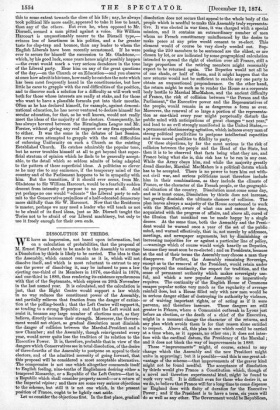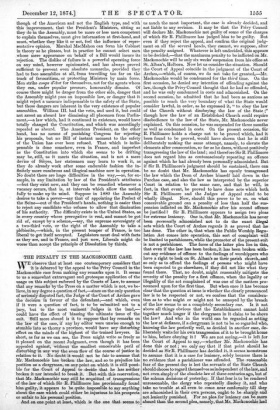DISSOLUTION BY THIRDS.
WE have an impression, not based upon information, but on a calculation of probabilities, that the proposal of M. Ernest Picard about to be made in the Assembly to arrange a Dissolution by thirds is likely to be carried. The idea is that the Assembly, which cannot remain as it is, which will not dissolve itself, and which is most reluctant to entrust to any one the power of dissolving it, may be induced to pass a law ejecting one-third of its Members in 1876, one-third in 1878, and one-third in 1880, thus rendering its existence synchronous with that of the Septennate, which expires on 20th November in the last named year. It is calculated, and the calculation is just, that the Right Centre would support a law which in no way reduces the constituent power of the Assembly, and partially relieves that fraction from the danger of extinc- tion at the polling-booth ; that the Left Centre will support it, as tending to a strong Republic ; and that the Left would not resist it, because any large number of elections must, as they believe, directly increase their strength. Moreover, the Govern- ment would not object, as gradual dissolution must diminish the danger of collision between the Marshal-President and a new Chamber ; and the Assembly, though reinvigorated every year, would never quite lose the tradition of its relation to the Executive Power. It is, therefore, probable that in view of the dangers which Conservatives see in total dissolution, of the desire of three-fourths of the Assembly to postpone an appeal to their electors, and of the admitted necessity of going forward, that this proposal will be considered a most acceptable alternative. The compromise is not one which altogether commends itself to English feeling, nine-tenths of Englishmen desiring either a tempered Monarchy, or a Republic of the Left Centre—that is, a Republic which shall consider property sacred—or a return of the Imperial re'gime ; and there are some very serious objections to the scheme, but still it is not one which, in the present position of France, ought to be lightly cast aside.
Let us consider the objections first. In the first place, gradual dissolution does not secure that appeal to the whole body of the people which is needful to make this Assembly truly representa- tive. It was elected in war time, it was charged with a special mission, and it contains an extraordinary number of men whom no French constituency uninfluenced by the desire to make peace at any price would consent to re-elect. This element would of course be very slowly weeded out. Sup- posing the 250 members to be sentenced are the eldest, or are chosen by lot, or are indicated by some geographical calculation intended to spread the right of election over all France, still a large proportion of the retiring members might reasonably expect to be returned again. The Deputies would not all be of one shade, or half of them, and it might happen that the new returns would not be sufficient to enable any one party to obtain an unquestioned preponderance. On the other hand, the return might be such as to render the House as a corporate body hostile to Marshal MacMahon, and the ancient difficulty of France, the risk of collision between "the Person and the Parliament," the Executive power and the Representatives of the people, would remain in as dangerous a form as ever. Moreover, the renewal of so large a portion of the representa- tion as one-third every year might perpetually disturb the public mind with anticipations of great changes "next year," and lead to an evil strongly manifested in the United States,— a permanent electioneering agitation, which induces every man of strong political proclivities to postpone intellectual capacities and even moral qualities to fidelity to party. Of these objections, by far the most serious is the risk of collision between the people and the Head of the State, but then it is to be observed that facts being what they are, and France being what she is, this risk has to be run in any case. While the Army obeys him, and while the majority greatly dread disorder, Marshal McMahon is a political datum which has to be accepted. There is no power to turn him out with- out civil war, and serious politicians must therefore include him in their combinations, as they include the climate of France, or the character of the French people, or the geographi- cal situation of the country. Dissolution must come some day, and as it must come, Dissolution by thirds does not increase, but greatly diminish the ultimate chances of collision. The plan leaves always a majority of the House accustomed to work with the Marshal, aware of what can and cannot be done, acquainted with the progress of affairs, and above all, cured of the illusion that mankind can be made happy by a single decree. At the same time, both the Assembly and the Presi- dent would be warned once a year of the set of the public mind, and warned effectively, that is, not merely by addresses, meetings, and newspaper arguments, but by diminishing or increasing majorities for or against a particular line of policy, —warnings which of course would weigh heavily on Deputies, because they must soon be re-elected ; and on Presidents, because at the end of their terms the Assembly may choose a man they disapprove. Farther, the Assembly remaining Sovereign, except as to the removal of the President, would retain under the proposal the continuity, the respect for tradition, and the sense of permanent authority which makes sovereignty use- ful, and which a new popular Assembly so imperatively requires. The continuity of the English House of Commons escapes popular notice very much as the regularity of average rainfall does, but a House filled only with new men would be in serious danger either of destroying its authority by violence, or of waiving important rights, or of acting as if it were parvenu, and therefore insecure. Those dangers are still greater in Fiance, where a Communist outbreak in Lyons just before an election, or the death of a chief of the Executive, might in a moment change the character of the returns, and any plan which avoids them is for that reason alone entitled to respect. Above all, this plan is one which could be carried at a time when, as it appears, no other can ; it does not inter- fere with the cardinal datum, the Presidency of the Marshal ; and it does not block the way of improvements in 1880.
These "improvements" might, of course, extend to any change which the Assembly and the new President might unite in approving; but it is possible—and this is one great ad- vantage of the scheme—that improvements of the graver kind might not be found needful. The acceptance of dissolution by thirds would give France a Constitution which, though of a novel and therefore experimental kind, might be found to work very well. It is difficult even for those who desire it, as we do, to believe that France will for a long time to come dispense as England does with fixity of duration for the Executive ' Power ; and if the President is to have a term, six years will do as well as any other. The Government would be Republican,
though of the American and not the English type, and with this improvement, that the President's Ministers, sitting as they do in the Assembly, must be more or less men competent to explain themselves, must give information at first-hand, and must, whether they like it or not, feel the influence of repre- sentative opinion. Marshal MacMahon can form his Cabinet in theory as he pleases, but in practice he cannot select men whose mere appearance on behalf of a Bill would insure its rejection. The dislike of failure is a powerful operating force on any mind, however opinionated, and has always proved sufficient to prevent even absolute monarchs, provided they had to face assemblies at all, from travelling too far on the track of favouritism, or protecting Ministers by main force. Men strike coups cratat for themselves, not for the agents whom they can, under popular pressure, honourably dismiss Of course there might be danger from the other side, danger that the Assembly might pass an impossible law, or danger that it might reject a measure indispensable to the safety of the State, but those dangers are inherent in the very existence of popular assemblies. William HI. had the veto, and used it, but could not arrest an absurd law dismissing all placemen from Pasha- ment,—a law which, had it continued in existence, would have totally changed the Constitution, and which was accordingly repealed as absurd. The American President, on the other hand, has no means of punishing Congress for rejecting his proposals, but no Bill of instant moment to the safety of the Union has ever been refused. That which is indis- pensable is done somehow, even in France, and imperfect as the Constitution into which she seems to be drifting may be, still, -as it meets the situation' and is not a mere device of Sieyes, her statesmen may learn to work it, as they do already work after some endurable fashion the in- finitely more cumbrous and illogical machine now in operation. No doubt there are huge difficulties in the way,--as, for ex- ample, in any limitation by law of the President's attributes —but they exist now, and they can be remedied whenever a vacancy occurs, that is, at intervals which allow the nation fully to make up its mind. Suppose in 1880 the Assembly desires to take a power—say that of appointing the Prefect of the Seine—out of the President's hands, nothing is easier than to reject any candidate who refuses to allow that diminution of his authority. The difficulty exists in the United States, as in every country where prerogative is real, and cannot be got rid of, except by a seheme,—say, the supreme sovereignty of a two-third vote, or the right of the Assembly to take a plebiscite,—which, in the present temper of France, is too liberal to get itself accepted. Legislators must deal with facts as they are, and in France, and just now, Liberals might do worse than accept the principle of Dissolution by thirds.







































 Previous page
Previous page